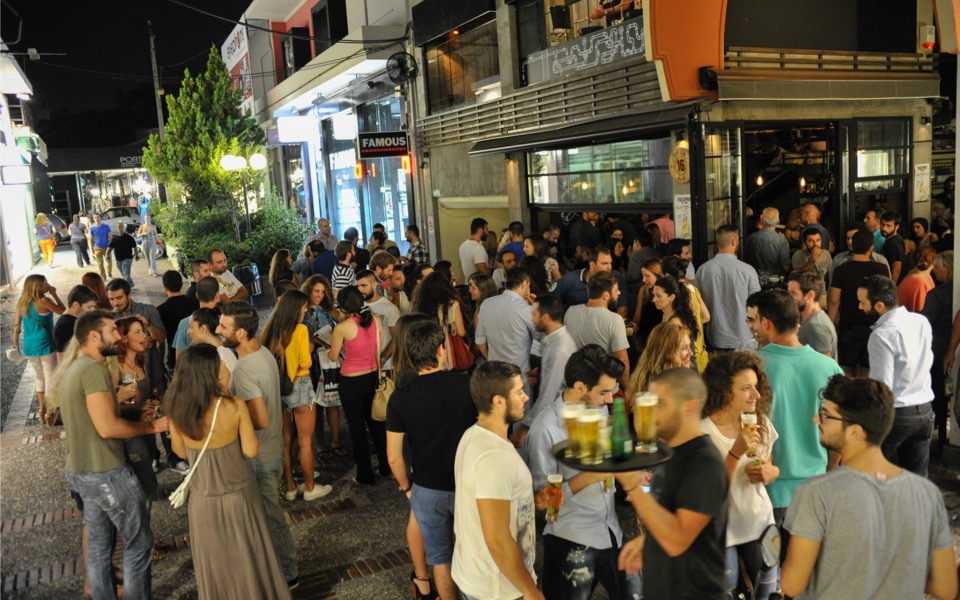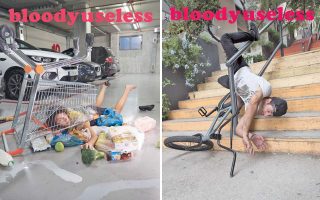Teen alcohol consumption going unchecked

“I admit I was shocked when my son came back drunk on Saturday night. He’s only 15 years old and had been out with friends, just as on many other weekends. He wasn’t late, but he was a mess. They’d been to a club in Glyfada, where they had beers and shots! How could they serve alcohol to kids?” one shocked father told Kathimerini on the condition of anonymity.
Costas Papageorgiou, a father to two, is also concerned about how easy it is for children to get their hands on alcohol in Greece. “Walking around downtown Athens you see hundreds of kids hanging out with a beer in hand,” he said. “There should be some control. A child can go to any kiosk or minimarket and buy beer or any alcoholic drink.”
Greek law prohibits the sale of alcoholic drinks to minors, that is children younger than 18 years old, or their entry to bars and clubs. Yet these laws are never enforced and, what’s worse, a lot of these places are even getting away with selling potentially lethal adulterated spirits.
Alcohol consumption among teenagers in Greece is widespread, largely because it is considered socially acceptable, even taking place in the home. According to a study on youngsters aged up to 16 by the University Mental Health Research Institute (UMHRI) in Athens, conducted as part of the European School Survey Project (ESPAD), 94.1 percent of respondents in Greece had consumed alcohol at some point and 66.2 percent in the month preceding the survey.
The study confirms what’s already apparent: 90.8 percent of those surveyed said they found it easy to obtain alcohol and 60.9 percent had consumed it at a bar, club, cafe or restaurant at least once in the previous month.
Regarding the amounts consumed and frequency, 38.3 percent of respondents admitted to having more than five drinks on one occasion in the past month and 12.5 percent had got drunk at least once in the same period.
Overall, 36.3 percent said they had been drunk at least once in their lifetime and 28.2 percent had in the last year.
For many kids, drinking alcohol is not something reserved for special occasions or the weekend, as 7.6 percent said they had had an alcoholic drink on at least 10 occasions in the month prior to the survey, with this average rising to 9.5 percent among boys – who favor spirits and beer – and dropping to 5.6 percent among girls – who prefer wine.
Overconsumption, with all of the risks this entails, affects one in 10 teens, according to the survey, which found that 9.9 percent of under-16s had consumed five or more drinks on at least three occasions in the month prior to the study. (Divided into boys and girls, the rate came to 12.2 percent among the former and 7.7 percent among the latter.)
The only good news from the survey is that in 2011, when the last UMHRI survey was carried out, this rate was 13.3 percent, meaning a drop of 3.4 percent by 2015, when this survey was carried out on some 3,200 students at 175 schools (the data were published in late 2017).
“Alcohol-related harm is the third biggest factor in the rise of morbidity and mortality in Europe. At the same time, it is a legal and very widely available product that is economically important to businesses and states,” said Anna Kokkevi, a clinical psychologist and professor emeritus at the University of Athens. “All of this requires a multidimensional approach to the issue, but under no circumstances should we treat alcohol as something innocent, especially when it comes to young people.”
Another worrying find was that 9.7 percent of under-16s admitted to having driven a vehicle under the influence of alcohol – which makes one wonder why they were allowed to drive and what kind of vehicle – and 0.9 percent said they had been involved in an accident when doing so.
One of the findings that points to the cultural aspect of the problem is the fact that 62.1 percent of teenagers had their first taste of wine or beer before the age of 13, according to the ESPAD survey.
“Greece is a wine-producing country and drinking wine or other alcoholic drinks is part of the country’s cultural heritage. You cannot imagine a festive dinner without there being wine, beer or some form of alcohol on the table,” said Kokkevi. “The question is how societies can hold onto the positive aspects of such cultural traits and avoid the harmful consequences.”
The age at which people start drinking is instrumental, says the expert.
“Children in Greece first taste alcohol much sooner than in other European countries and many parents actually encourage their children – wrongly, of course – to taste beer or wine at a very young age,” said Kokkevi.
This misguided practice tends to be spurred by the belief that it will take the mystique out of alcohol and make children less eager to get their hands on it. However, it also breeds familiarity and the data show that 4.7 percent of under-16s got drunk for the first time when they were younger than 13.
Another fact pointing to the cultural aspects of the issue, as well as the effect of having easier access, is that alcohol consumption in general tends to be higher in rural parts of the country than in Athens and other cities. That said, alcohol consumption among minors has decreased steadily since the 1980s, pointing to more public awareness, as well as progress with programs like the OKANA detoxification center.
“People need to acknowledge that alcohol is not harmless. It is an addictive substance like nicotine and narcotics,” said Kokkevi. “The main thing is to educate children at school and in the home. Banning it is not the way to really solve the problem, especially when it comes to teens who see breaking a ban as a challenge.”
Experts want to see more being done to tackle the phenomenon on every level and point to the proliferation of sweet fizzy drinks that contain alcohol as a sign that there is not enough awareness on the part of the state and consumers.
“We have written to more than 40 societies, agencies, foundations and public organizations asking for support for our research and only one has replied,” said a spokesperson for ESPAD in Greece. “Sure, the economic crisis causes problems but we were hoping for more participation and interest.”





